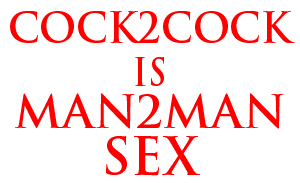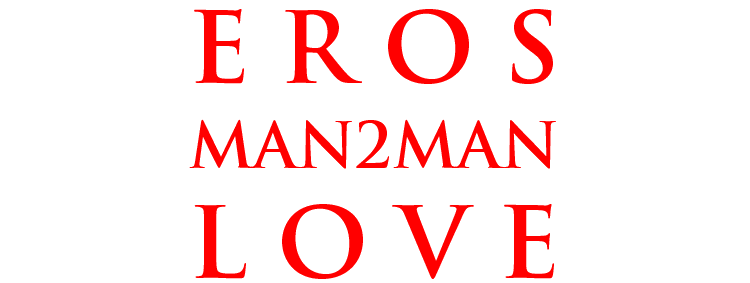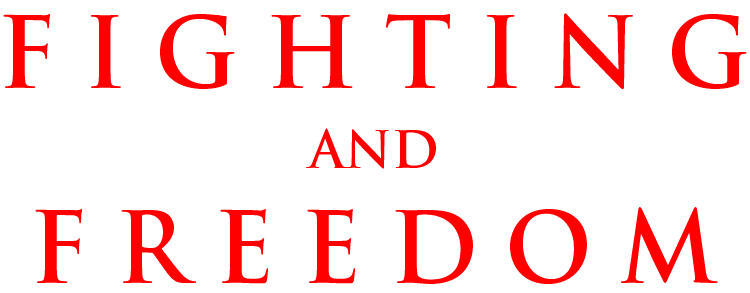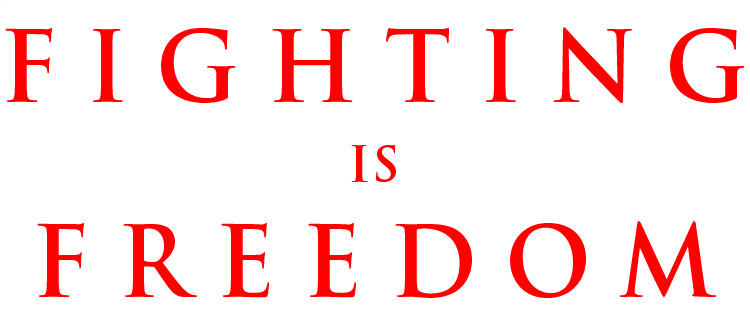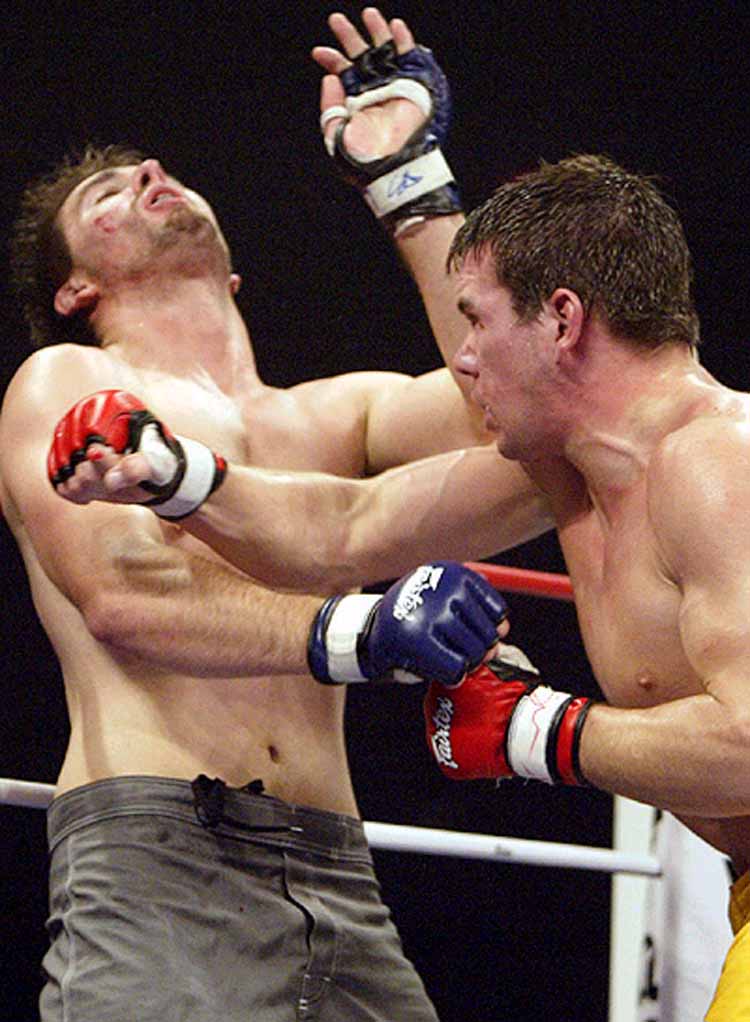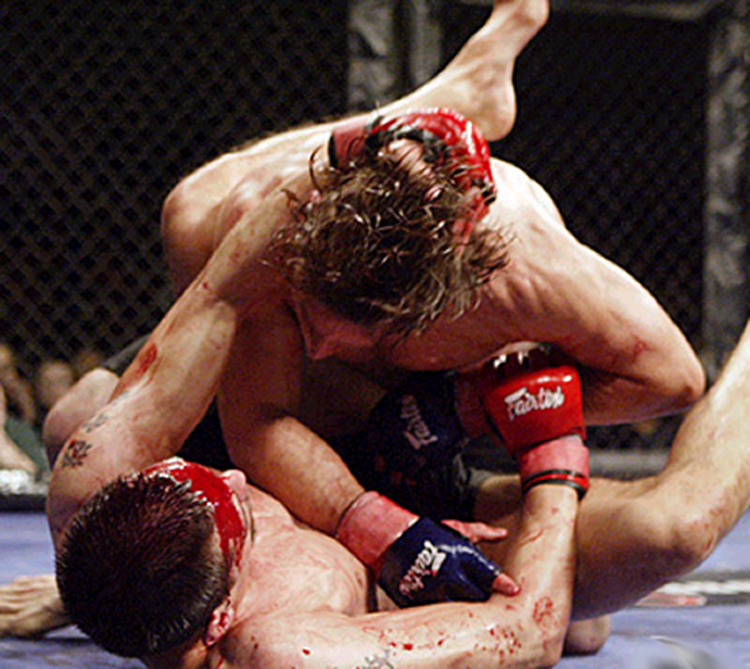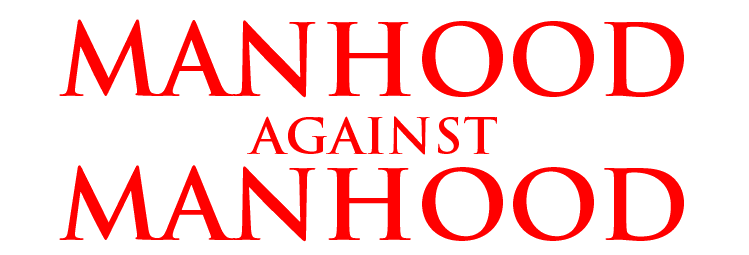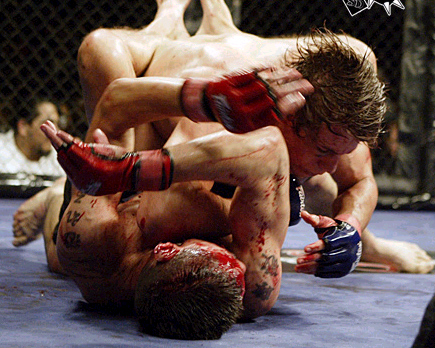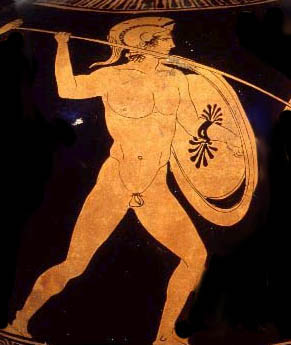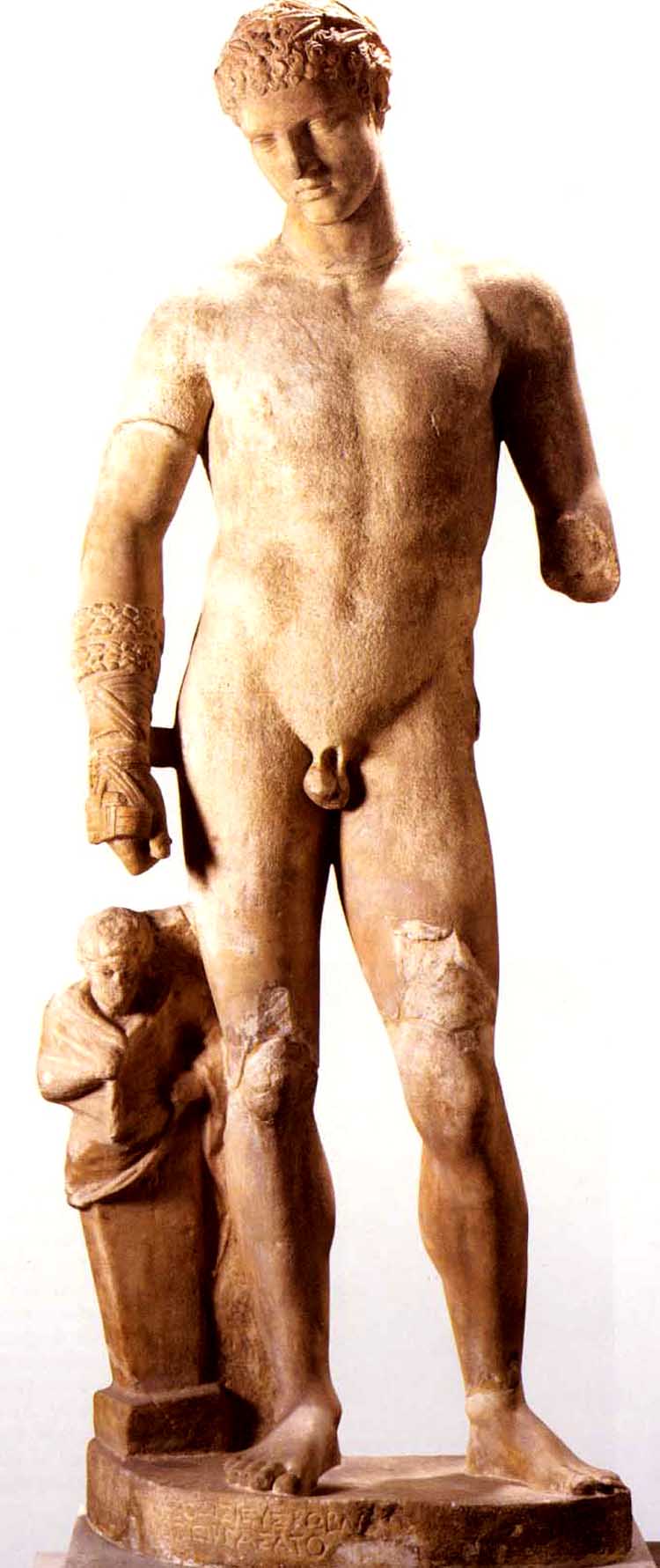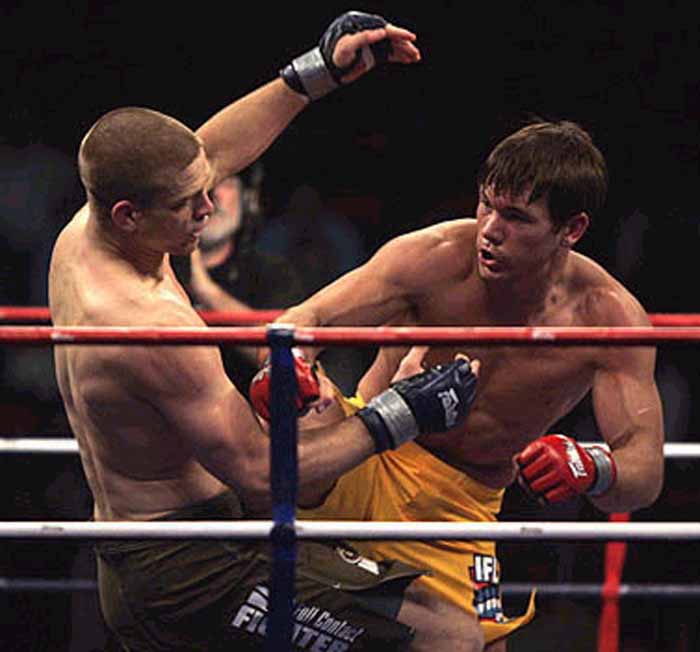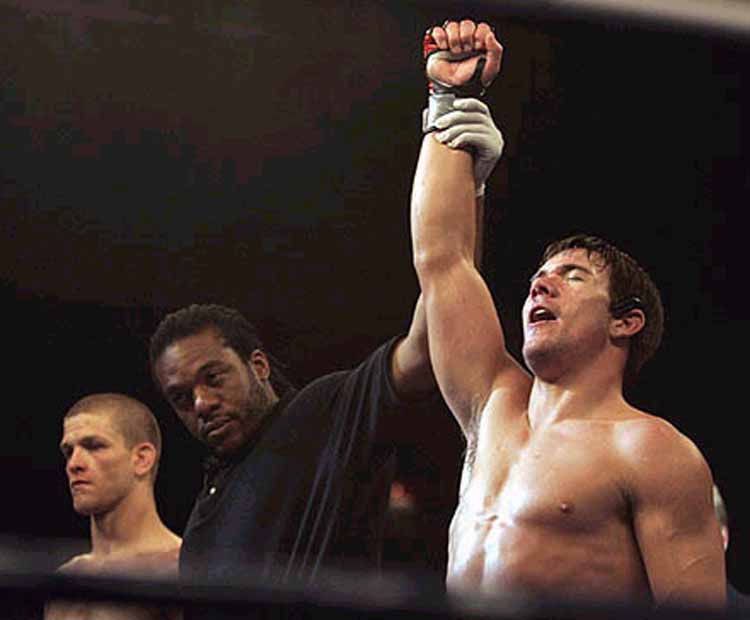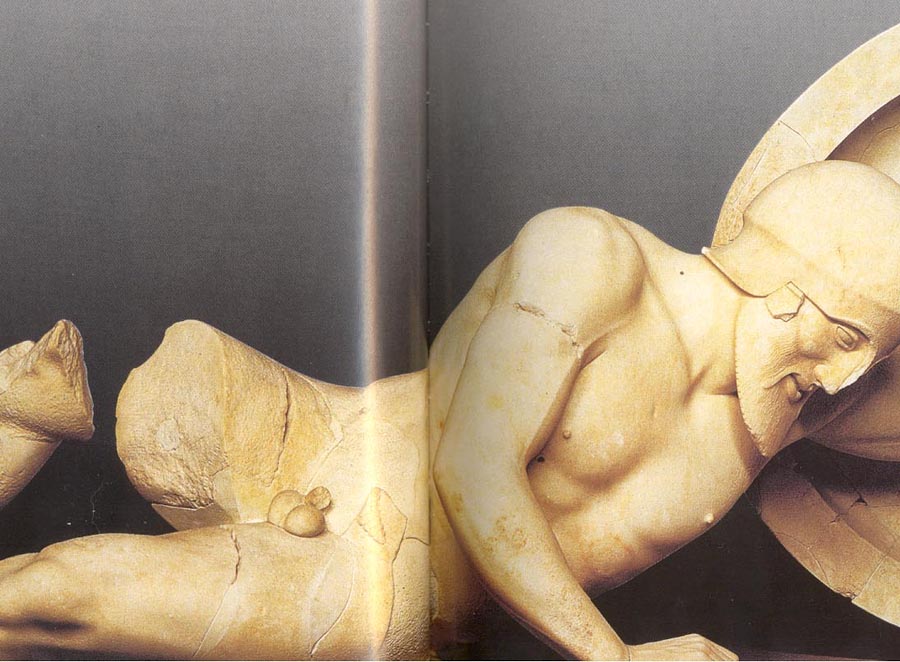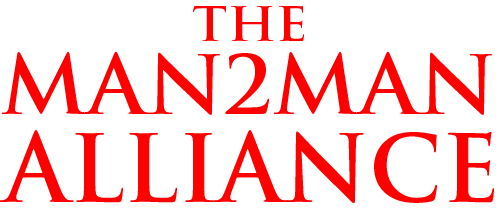






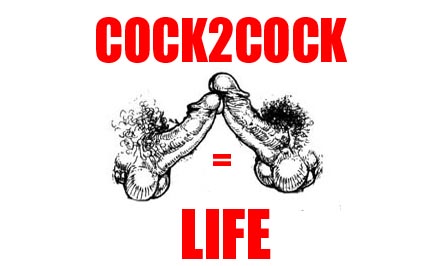

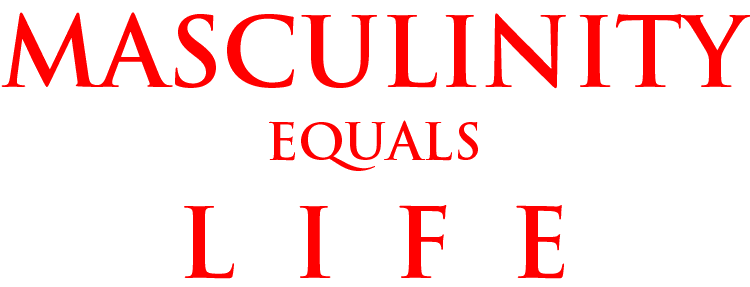

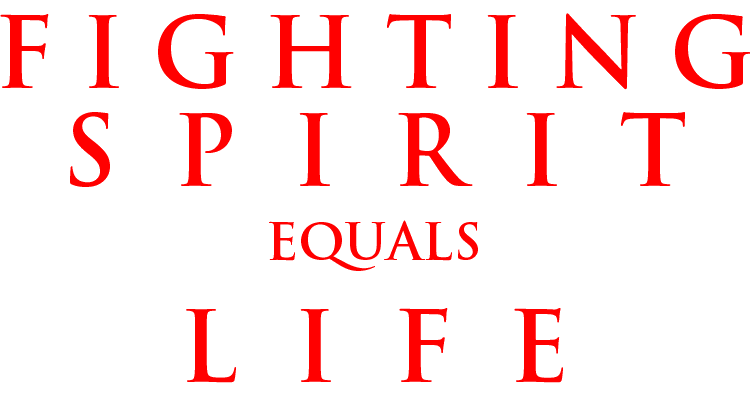


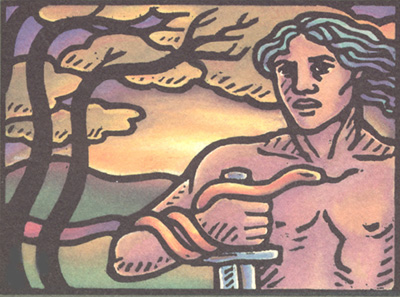


The Struggle Is Important
6-14-10
Intro note from Bill Weintraub.
This is a letter I received, along with a donation, from a new Warrior who lives in San Francisco aka Buttfuck Central.
He asked to be posted anonymously because, as he said,
"These people who make broad claims for tolerance are among the most intolerant I've ever met."
That is a pure and absolute truth.
And there are more truths in Warrior Tom's letter --
So -- ck it out:
Tom:
The Alliance has an excellent website. I have read practically everything on the site carefully, and I agree completely with your main conclusions. The body of information collected on the site over about 10 years of effort now is an important achievement.
I think you are right to devote lots of discussion to ancient Greece as an alternative culture with a great deal to teach us.
You write superbly, by the way. You are always very, very clear, and that is refreshing. You obviously take a lot of time and put a lot of effort in what appears on the site.
By coincidence, right after I read The Warrior Altruism of the Warrior God, I happened to read this review of a book about American soldiers in Afghanistan. While the book's conclusion take a slightly different slant or describes the soldiers' motives in slightly different terms, I think it complements your views about Greek warriors. Mind you, I haven't yet read the book so this opinion is based solely on the review.
You may know that during the last phase of the Second World War in Europe, during the invasion of Normandy, the American forces had a very high rate of desertion in the beginning. Our infantry troops driving across Europe and into Germany were made up almost entirely of boys 18 and 19 with no combat experience. Our soldiers were at first moved about from unit to unit to fill places left by the many dead and wounded troops, so they developed no group cohesion. It will come as no surprise that after the Army started keeping the boys in the same unit, desertion rates dropped dramatically. Our soldiers then overcame their fear and stayed with their units in the face of fire because they didn't want to dishonor themselves in front of their comrades.
This morning I went into a coffee shop and saw a sign for the upcoming annual AIDS Walk that said in bold type, "To end AIDS fight against homophobia." I think most people in the city would read that and never realize its absurdity. So now, after thirty years, it's come to this: rather than blame specific sexual practices we know lead to AIDS, let's place the blame on the prejudice of others rather than our own actions. I suppose they are saying that if other people just have the right attitude, no one would get AIDS. I used to contribute to the AIDS Walk, but I think I'll take a pass this year. I'd rather give the money to you who are actually trying to do something effective against AIDS and other sexually-transmitted diseases.
Our entire society is truly diseased in many ways. I despair about changing the culture because the tide is growing stronger and seems to be self-reinforcing. Still, I think we should make the effort to bring about a change in the way of thinking. We can't just give in. The struggle is important, and I am grateful to you for being such an effective spokesman and leader.
I am sending along a small contribution to help with the expenses of keeping the Alliance going.
Sincerely,
Tom
Re: The Struggle Is Important
6-14-10
Hey Tom,
Thank you for your donation.
Tom, I appreciate too your many kind words about our site and my work.
Let's take a look -- you said a great many things that are important:
Thank you Tom.
That's excellent -- that's the best thing you can do.
Good, Tom, I'm glad.
Thank you, Tom.
Thank you Tom, and I appreciate hearing that.
An affirming statement like yours helps me as I work to go forward
with that discussion.
Thank you, Tom.
Tom, thank you again.
Yes, I do.
Yes -- and thank you for including the review with your letter.
And guys, the review is of a book titled War, by Sebastian Junger, and here are some excerpts from that review:
[The author, Mr Junger,] is in awe of his fellows' fighting skills and mostly good-tempered acceptance of, indeed sometimes relish for, appalling danger. This leads him to a broader inquiry into why this is generally true of modern soldiers. The main reason, Mr Junger observes and numerous studies have confirmed, is love. The Americans in the Korengal, heroes by the standards of any warrior culture, are not especially religious or patriotic. They show little interest in the war overall or allegiance to the army at large; indeed, they cheer other units' misfortunes. Rather, with passionate intensity, they fight for each other. "What the Army sociologists, with their clipboards and their questions and their endless meta-analyses slowly came to understand was that courage was love," Mr Junger writes. "In war, neither could exist without the other." "with passionate intensity, they fight for each other"
"courage is love"
Tom, that's very useful and I'll make use of it in my work.
Yes -- which the Greeks could have told them.
The Spartans in particular kept their guys, from the Agogé forward, in
small groups to encourage that sort of cohesion.
The Sacred Band of Thebes used the same principle.
Plato writes about it in a number of places, including this passage in the Symposium:
~ Symposium 179, translated by Boswell
So -- the idea that Courage is Love and Love is Courage and neither can exist without the other -- has been well-understood for literally thousands of years.
And guys, to understand more about that for yourselves, please ck out The Warrior Altruism of the Warrior God -- because it's important that you understand the way Warrior Societies function.
Tom:
Yes -- and as you may know, for many years now we've addressed absurdities like "stigma
causes AIDS" and "homophobia causes AIDS."
In point of fact, there's NO empirical evidence to support those views.
And in the case of stigma, there's actually research which
demonstrates NO correlation between stigma and HIV infection.
Same with homophobia -- if that were true, HIV infection rates among
American men who have sex with men would be highest in the Bible Belt.
Instead they're highest in coastal cities with large, openly "gay,"
populations who are protected by civil rights legislation and
well-tolerated culturally -- SF, LA, NYC, etc.
Couldn't be clearer.
Right.
And really, it came to that many years ago.
Or something like that.
Truth is, their thinking is so cloudly and irrational that it's almost
impossible to address.
As you say, we know the sexual practices which lead to AIDS.
Every piece of peer-reviewed research published since 1984 confirms that anal penetration is the vector in at least 90% of all cases of HIV infection among MSM.
While oral accounts for somewhere between one and ten percent of the cases.
We list the most important research articles in our MSM HIV Timeline; and again, I encourage our guys to look at that page and see how overwhelming the evidence is.
We also know, and have known for years, that in Holland, when anal penetration, whether with or without a condom, was discouraged, the rate of new HIV infection dropped dramatically.
I talk about that in The Dutch Experiment.
And it's also discussed in this article / book:
Harm Hospers and Cor Blom, "HIV Prevention Activities for Gay Men in
the Netherlands 1983-93" in Theo Sandfort (Ed.) The Dutch Response to
HIV Pragmaticism and Consensus. New York: Routledge, 1998.
And -- guess what?
US researchers routinely ignore that discussion.
YES!!!
That's what's needed.
The only thing those people care about -- is money.
If we could significantly disrupt the flow of money into organzations
like SF AIDS, we'd be getting somewhere and -- they'd be forced to
talk to us.
As it is, now, they won't.
Tom, I have an old friend who routinely raises tens of thousands of dollars each and every year
for his local AIDS "charity."
He's one of their prime donors.
When I ask him -- where's the money go?
He can't tell me.
But he does it anyway, because he wants to honor the memory of his lost lover.
And that's what the ASO's -- the AIDS Service Organizations -- play off of.
That grief.
They exploit it.
Yes, and that's the right thing to do.
Yes it is.
Yes, it has been growing stronger and certainly it's self-reinforcing.
But Tom, that's true of any dominant culture.
Nevertheless, all cultures do eventually change, and this one will too.
Of course.
That's right.
And there's no reason to.
Our opponents are extremely well-funded and have a lot of cultural support.
But we have the Truth.
And as I often say, there's no ally more powerful than Truth.
If we will only put it forth.
Right now, the level of donation is so low that we're just barely staying alive.
But the day that changes, the day that our guys show the will to truly
speak Truth to power, the whole "gay / AIDS Inc" edifice will crumble
and fall.
Thank you Tom.
And thank you again.
Again, Tom, your donation is greatly needed and greatly appreciated.
Bill Weintraub
So guys, Tom says that "The struggle is important" -- and he's right.
And he's able to make the connections between the Greeks, our work, and our soldiers in Afghanistan.
In a separate email, Tom mentioned the photo on the back dustcover of Mr Junger's book, of which he said, "When there was a long lull in Taliban attacks the Americans took to this - a sort of agogé in the bush."
If I could be identified I think there would be a lynch mob of sodomites headed my way to get my ass. These people who make broad claims for tolerance are among the most intolerant I've ever met.
The Alliance has an excellent website.
I have read practically everything on the site carefully,
and I agree completely with your main conclusions.
The body of information collected on the site over about 10 years of effort now is an important achievement.
I think you are right to devote lots of discussion to ancient Greece as an alternative culture with a great deal to teach us.
You write superbly, by the way.
You are always very, very clear, and that is refreshing.
You obviously take a lot of time and put a lot of effort in what appears on the site.
By coincidence, right after I read The Warrior Altruism of the Warrior God, I happened to read this review of a book about American soldiers in Afghanistan. While the book's conclusion take a slightly different slant or describes the soldiers' motives in slightly different terms, I think it complements your views about Greek warriors. Mind you, I haven't yet read the book so this opinion is based solely on the review.
You may know that during the last phase of the Second World War in Europe, during the invasion of Normandy, the American forces had a very high rate of desertion in the beginning. Our infantry troops driving across Europe and into Germany were made up almost entirely of boys 18 and 19 with no combat experience. Our soldiers were at first moved about from unit to unit to fill places left by the many dead and wounded troops, so they developed no group cohesion. It will come as no surprise that after the Army started keeping the boys in the same unit, desertion rates dropped dramatically. Our soldiers then overcame their fear and stayed with their units in the face of fire because they didn't want to dishonor themselves in front of their comrades.
if we could somehow contrive to have a city or an army composed of lovers and those they loved, they could not be better citizens of their country than by thus refraining from all that is base in a mutual rivalry for honor; and such men as these, when fighting side by side, one might almost consider able to make a little band victorious over all the world. For a man in love would surely choose to have all the rest of the host rather than the one he loves see him forsaking his station, or flinging away his arms; sooner than this, he would prefer to die many deaths: while, as for leaving the one he loves in the lurch, or not succoring him in peril, no man is such a craven that the influence of Love [Eros] cannot inspire him with a courage that makes him equal to the bravest born; and without doubt what Homer calls a "fury inspired" by a God [Ares] in certain heroes is the effect produced on lovers by Love's peculiar power. Moreover, only such as are in love will consent to die for others.
This morning I went into a coffee shop and saw a sign for the upcoming annual AIDS Walk that said in bold type, "To end AIDS fight against homophobia." I think most people in the city would read that and never realize its absurdity.
So now, after thirty years, it's come to this: rather than blame specific sexual practices we know lead to AIDS, let's place the blame on the prejudice of others rather than our own actions.
I suppose they are saying that if other people just have the right attitude, no one would get AIDS.
I used to contribute to the AIDS Walk, but I think I'll take a pass this year.
I'd rather give the money to you who are actually trying to do something effective against AIDS and other sexually-transmitted diseases.
Our entire society is truly diseased in many ways.
I despair about changing the culture because the tide is growing stronger and seems to be self-reinforcing.
Still, I think we should make the effort to bring about a change in the way of thinking.
We can't just give in.
The struggle is important, and I am grateful to you for being such an effective spokesman and leader.
I am sending along a small contribution to help with the expenses of keeping the Alliance going.
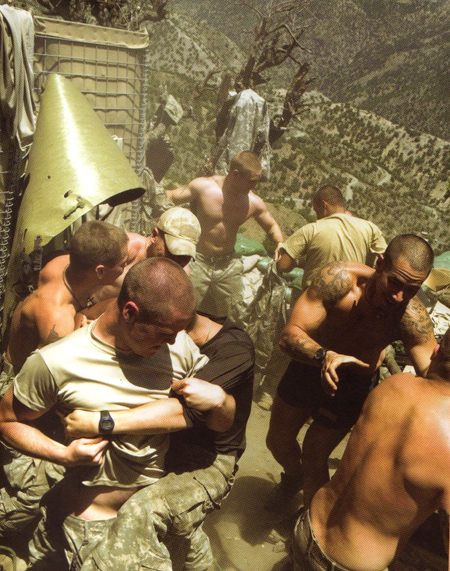
And I thank Warrior Jim, author of to deepen, not weaken, masculinity, for sending along that pic.
Warrior Jim too has recommended the Junger book based on a review.
So what we can see here:

Is contemporary American soldiers doing what ancient Greek soldiers did when they were on campaign but not actively fighting -- and that is, building Warrior bonds by Wrestling each other and together.
Which also builds, as Warrior NW has made clear, Fighting skills.
While giving the Men, the Warriors, skin-on-skin contact.
What we can see, then, is that Warrior Behavior -- which is really just Masculine Behavior or, if you prefer, Man Behavior -- is very consistent over not just the years or decades, but the millenia.
I've posted on this site about how Blackwater mercenaries in Iraq took to sunbathing nude together on the roof of their compound.
Until a female helicopter pilot complained.
But again, it's normal and natural for Warriors to want to be nude together.
Just as showering nude together helps reinforce bonds on a sports team, so does nudity in the field help build what modern military experts call "unit cohesion" and what is really simply normal and LOVING Bonds between MEN.
That's the The Warrior Bond, and again, it's been well understood by Men -- for millenia.
It's only been very recently, as heterosexualization has taken off and destroyed single gender spaces, that that sort of nudity and rough-housing among Men, which is ESSENTIAL for them, has been questioned and denigrated and targeted for destruction.
And guys, if you don't understand the term heterosexualization and how heterosexualization functions, please read Sex Between Men: An Activity, Not A Condition.
Again, Sex Between Men: An Activity, Not A Condition is essential reading for any member of the Alliance or just site visitor.
So -- as Warrior NW has said to me, this sort of rough-housing and wrestling, this sort of rough and tumble, is encoded in our male DNA.

It's something that Men must have -- in order to be Men.
Now -- here are the closing paragraphs of the review in The Economist -- the review, for whatever reason, is unsigned:
"War" becomes a love story, which Mr Junger sees unfold among a bunch of filthy infantrymen on a shot-up Afghan crag. He suggests many explanations for their growing attachment: a shared experience of suffering; an absence of other close relationships; an instinctive appreciation that the best hope for self-preservation lies with the group. In fact, as Mr Junger shows with several examples of suicidal bravery, this impulse can be fatal. Pondering the irony of that, he argues that the fame societies reserve for fallen heroes provides small compensation for their premature deaths, ensuring their names live on after their genes have been extinguished. This book provides that service for Juan Restrepo, Larry Rougle, Jason Bogar and the other Americans killed in the Korengal.
One thing Mr Junger does not do, however, is push his main point to its logical conclusion: if soldiers fight bravely for love, then so may the Taliban.
Several things here:
The reviewer, whoever he or she may be, says
"War" becomes a love story, which Mr Junger sees unfold among a bunch of filthy infantrymen on a shot-up Afghan crag. He suggests many explanations for their growing attachment: a shared experience of suffering; an absence of other close relationships; an instinctive appreciation that the best hope for self-preservation lies with the group.
First point:
"War" becomes a love story, which Mr Junger sees unfold among a bunch of filthy infantrymen on a shot-up Afghan crag.
As I told Tom, years ago, when I'd first "come out," I met a Viet Vet -- the war was still raging over there -- who'd grown up "straight" in rural Vermont, gotten married, had a daughter, gotten into some trouble with the law, and opted for Vietnam rather than jail.
He was put in a platoon on constant patrol -- and there --
He and his best buddy became lovers under fire.
They had two months together as lovers, were always under fire, and then, two days short of r & r, the buddy was killed.
And of course my guy, whose name was Chuck, spent the rest of his life looking for him.
True story.
Chuck had malaria, was deaf in one ear, etc.
When I said to him, I'm very sorry about what happened to you, he said --
I'm not.
If I'd stayed in Vermont I'd have been a redneck all my life.
Vietnam opened my eyes.
Besides, compared to the suffering of the Vietnamese people, what happened to me was nothing.
That's what he said.
So -- love among "filthy infantrymen" is nothing new.
It wasn't new when it happened among the Greeks.
And it's not new to Americans either.
The reviewer continues:
[Mr Junger] suggests many explanations for their growing attachment: a shared experience of suffering; an absence of other close relationships; an instinctive appreciation that the best hope for self-preservation lies with the group.
So the assumption is that when "men" or "real men" love each other, "explanations" are needed for their conduct.
That would have been news to the Greeks.
Remember what the great classicist KJ Dover said in his introduction to Plato's Symposium -- in Bill Weintraub's formulation:
Wherever and whenever the emphasis on same-sex love -- that is, Eros -- in the Greek world originated, the simple answer to the question 'Why were the Athenians of Plato's time so fond of male-male relations?' is 'Because their fathers and grandfathers were'.
In other words, because this is something which MEN do.
And which is part of Warrior culture and the Warrior Kosmos.
You don't need more explanation than that.
Yet you'll notice that Mr Junger, according to the reviewer, falls back on the old "an absence of other close relationships."
Once again, that would have been news to the Greeks, who, says Dover, again in my formulation,
did not consider male-male relations incompatible with concurrent male-female relations or with marriage...
So -- a Greek Man was, and an American Man is, capable of having "close relationships" with both another Man and a Woman -- simultaneously.
That was the rule in ancient Greece.
And it still happens, despite all the societal shibboleths, right here in the US of A.
The Economist's reviewer goes on to say
In fact, as Mr Junger shows with several examples of suicidal bravery, this impulse can be fatal. Pondering the irony of that, he argues that the fame societies reserve for fallen heroes provides small compensation for their premature deaths, ensuring their names live on after their genes have been extinguished. This book provides that service for Juan Restrepo, Larry Rougle, Jason Bogar and the other Americans killed in the Korengal.
Here too, Mr Junger, and/or the reviewer, betrays an ignorance of the basics of Warrior society.
As the great classicist Werner Jaeger has pointed out, and as we discussed in AGOGE V: A Nation of Heroes: State-Education in Sparta, it was the Spartans, via their great national poet Tyrtaeus, who first made heroes of ordinary citizen soldiers:
Tyrtaeus' Call to Areté The will which made Sparta a great nation still lives in the elegies of Tyrtaeus. It had the power to create a great ideal, a power which long survived historical Sparta, and is not yet exhausted; and these poems are the strongest manifestation of that power. ... [T]he ideal which inspired [Sparta's] citizens, and towards which, with iron consistency, every effort of every Spartan was directed, is imperishable because it is an expression of a fundamental human instinct. Although the society which incorporated it appears to us to have been partial and limited in its outlook, the ideal itself remains true and valuable. Plato himself considered the Spartan conception of the citizen's functions and education to have been narrow-minded, but he saw that the Spartan idea immortalized in Tyrtaeus' poems was one of the immutable bases of political life. The Greeks of his time did not give unqualified approval to Sparta and her policy, but they recognized the value of her ideal. ...
[T]he position which Plato alloted to Tyrtaeus in his cultural system remained valid for the Greeks of all subsequent ages, and was an indefeasible element of their culture. It was Plato who arranged and systematized the spiritual inheritance of his nation: in his synthesis, the various ideals which inspired Greece are objectified and set in their correct relationships. Since then, no great change has been made in his system; and the Spartan ideal has for two thousand years kept the position in the history of civilization which Plato assigned to it. [37]
Footnote 37: This admiration for Spartan valour and its expression in Tyrtaeus' poems should not be confused with the philo-Laconism of political reaction of later centuries. The spirit of Leonidas, who died with his Spartans at Thermopylae for the freedom of Greece, after the soldiers of other cities had abandoned their positions, remains the genuine monument of that ideal.
The elegies of Tyrtaeus are inspired by a mighty educational ideal. The demands which they make on the self-sacrifice and patriotism of the Spartans were no doubt justified by the circumstances in which they were written -- Sparta was almost sinking under the burden of the Messenian war. But they would not have been admired by later ages as the supreme expression of the Spartan will to forget oneself in one's country, if they had not been a permanent and timeless utterance of that ideal. The standards they impose on every citizen's thoughts and actions were not produced by a momentary outburst of warlike patriotism; they were the foundation of the whole Spartan cosmos.
Nothing in Greek poetry shows more clearly how the creative activity of the poet begins in the life of the society to which he belongs. ... he is the universal I, he is what Demosthenes calls "the voice of the country."
...
The Greek poets had for centuries been the heralds of areté, and such a herald now appeared in Tyrtaeus. As we have observed, the legend said he was sent by Apollo -- a striking expression of the strange truth that when a spiritual leader is needed he always comes. Tyrtaeus came to express in eternal poetry the new civic virtues which were needed in the national crisis.
[Jaeger then explains the difference between "elegiac" and "heroic" -- or "epic" -- poetry:]
Apart from the elegiac metre itself -- which in the earliest times had no special name to distinguish it from the heroic metre -- there is only one constant element in elegiac poetry. It is always addressed to someone : either to one individual or to a collective of people. ... Tyrtaeus, for example, speaks either to the citizens of Sparta or to the young men of Sparta. ... The epic with its mythical examples is set in an imaginary world; the elegy, with its address to real concrete people, takes us into the actual situation which inspired the poet.
[Jaeger then explains that Tyrtaeus] borrowed much of Homer's language, words, phrases ...
Even in the epic, the speeches made at the crises of the fighting have a strongly protreptic [hortatory -- encouraging and instructing] effect. They seem to be addressed not so much to the other characters as to Homer's audience. Certainly the Spartans felt that effect very strongly. Tyrtaeus had only to transfer the vast moral impetus of these speeches from Homer's imaginary battles to the real struggles of the Messenian war, and he had created his elegy. We shall understand that spiritual transference better if we read Homer as the age of Tyrtaeus and Hesiod read him -- not as the narrator of the past, but as the teacher of the present.
...
[Jaeger then looks at this poem by Tyrtaeus, which we've seen before, though in a slightly different form; here I'm using a prose translation by Douglas Gerber.
Tyrtaeus begins by deprecating values which are dear to the aristocracy:]
I would not mention or take account of a man for his prowess in running or wrestling, not even if he had the size and strength of the Cyclopes and outstripped Thracian Boreas in the race, nor if he were more handsome than Tithonus in form and richer than Midas and Cinyras, nor if he were more kingly than Pelops, son of Tantalus, and had a tongue that spoke as winningly as Adrastus', nor if he had a reputation for anything -- save furious valour.
For no man is good in war unless he can endure the sight of bloody slaughter and, standing close, can lunge at the enemy.
This is excellence, this the best human prize and the fairest for a young man to win.
This is a common benefit for the state and all the people, whenever a man with firm stance among the front ranks never ceases to hold his ground, is utterly unmindful of shameful flight, risking his life and displaying a steadfast spirit, and standing by the man next to him speaks encouragingly.
This man is good in war. He quickly routs the bristling ranks of the enemy and by his zeal stems the tide of battle.
And if he falls among the front ranks, pierced many times through his chest and bossed shield and corselet from the front, he loses his own dear life but brings glory to his city, to his people, and to his father. Young and old alike mourn him, all the city is distressed by the painful loss, and his tomb and children are pointed out among the people, and his children's children and his line after them. Never do his name and good fame perish, but even though he is beneath the earth he is immortal, whoever it is that furious Ares slays as he displays his prowess by standing fast and fighting for land and children.
And if he escapes the doom of death that brings long sorrow and by his victory makes good his spear's splendid boast, he is honoured by all, young and old alike, many are the joys he experiences before he goes to Hades, and in his old age he stands out among the townsmen; no one seeks to deprive him of respect and his just rights, but all men at the benches yield their place to him, the young, those of his own age, and the elders.
Let everyone strive now with all his heart to reach the pinnacle of this excellence, with no slackening in war.
Jaeger:
[Tyrtaeus] has recast the Homeric ideal of the single champion's areté into the areté of the patriot, and with that new faith he strives to inspire his whole society. He is endeavouring to create a nation of heroes. Death is beautiful if it is a hero's death; and to die for one's country is a hero's death. That is the only thought which can exalt a dying man, by making him feel that he is sacrificing himself for a higher good than his own life.
[This is, adds Jaeger, a "transvaluation of the idea of areté".]
[The dead soldier, says Tyrtaeus,] though he lies beneath the earth, becomes immortal.
The glory of a Homeric hero, however widely it is disseminated by the wandering bard, is nothing to the glory of a simple Spartan warrior, as Tyrtaeus describes it, laid up forever deep in the hearts of his people. The close community of the city-state, which seemed at the beginning of the poem to be only an obligation, now appears a privilege and an honour: it is the source of all ideal values. The first part [of the poem] states the heroic ideal of areté in terms of the city-state. The second restates, in the same terms, the heroic ideal of glory. Areté and glory are inseparable in the epic. Glory is now to be given, and areté exercised, by and in the city-state. The polis lives when the individual dies; and so it is a safe guardian of the 'name' and with it, of the future life of a hero.
The early Greek city-state was small, but it had something truly heroic and truly human in its nature. Greece, and in fact all the ancient world, held the hero to be the highest type of humanity.
So -- Mr Junger or the reviewer asserts that "the fame societies reserve for fallen heroes provides small compensation for their premature deaths, ensuring their names live on after their genes have been extinguished."
But that's simply NOT how Warriors and Warrior Societies have seen it -- as exemplified by the great Spartan poet Tyrtaeus, who, thanks to Plato, has had a huge influence for literally thousands of years:
This man is good in war. He quickly routs the bristling ranks of the enemy and by his zeal stems the tide of battle.
And if he falls among the front ranks, pierced many times through his chest and bossed shield and corselet from the front, he loses his own dear life but brings glory to his city, to his people, and to his father. Young and old alike mourn him, all the city is distressed by the painful loss, and his tomb and children are pointed out among the people, and his children's children and his line after them. Never do his name and good fame perish, but even though he is beneath the earth he is immortal, whoever it is that furious Ares slays as he displays his prowess by standing fast and fighting for land and children.
And if he escapes the doom of death that brings long sorrow and by his victory makes good his spear's splendid boast, he is honoured by all, young and old alike, many are the joys he experiences before he goes to Hades, and in his old age he stands out among the townsmen; no one seeks to deprive him of respect and his just rights, but all men at the benches yield their place to him, the young, those of his own age, and the elders.
Let everyone strive now with all his heart to reach the pinnacle of this excellence, with no slackening in war.
So -- the man who falls is made immortal by his death.
Bringing glory to his city, his people, his father, and his children and children's children.
Jaeger:
Death is beautiful if it is a hero's death; and to die for one's country is a hero's death. That is the only thought which can exalt a dying man, by making him feel that he is sacrificing himself for a higher good than his own life.
The Warrior sacrifices himself for a *higher good* than his own life.
That's Moral Heroism.
And Moral Heroism, the sacrifice of self for friend or family or lover or country or ideal -- is, says Aristotle, the highest form of Areté, of Warrior Excellence and Virtue.
And of course it's also Warrior Altruism.
Jaeger: "The early Greek city-state was small, but it had something truly heroic and truly human in its nature. Greece, and in fact all the ancient world, held the hero to be the highest type of humanity."
The hero is the highest type of humanity.
The Men in Mr Junger's book recognize that.
The Men Love each other with, we're told, passionate intensity.
Is it too much to say that they Love each other because they're Heroes?
Is it wrong to say that, should we be afraid to say it?
Of course not.
The Men Love each other *because* they're Heroes.
Courage becomes Love, Love becomes Courage.
That's how it has to be.
You can't have the Love -- without the Courage.
That's just the human condition.
The Spartan Tyrtaeus says "Never do the Warrior's name and good fame perish, but even though he is beneath the earth he is immortal" --
a belief which is very clearly picked up by the Athenian Pericles, Sparta's enemy, in his great funeral oration:
For this offering of their lives made in common by them all they each of them individually received that renown which never grows old, and for a sepulchre, not so much that in which their bones have been deposited, but that noblest of shrines wherein their glory is laid up to be eternally remembered upon every occasion on which deed or story shall call for its commemoration. For heroes have the whole earth for their tomb; and in lands far from their own, where the column with its epitaph declares it, there is enshrined in every breast a record unwritten with no tablet to preserve it, except that of the heart. These take as your model and, judging happiness to be the fruit of freedom and freedom of valour, never decline the dangers of war.
"For heroes have the whole earth for their tomb; . . . These take as your model and, judging happiness to be the fruit of freedom and freedom of valour, never decline the dangers of war."
So -- I don't know how many of you are still with me after that long passage from Jaeger and Tyrtaeus, but -- this is how Men in Warrior Culture -- Men who Truly Love each other -- Heroes who Love each other unto death -- think.
Junger, according to the reviewer, speaks of "suicidal bravery."
"suicidal"
Human beings are social animals.
They commonly, because they must, put others ahead of self.
To an observer of Men at War, an observer from an exceptionally hedonistic and selfish civilian society, Warrior selflessness may sometimes appear "suicidal."
But --
If you read the "citations highlighting these acts of bravery and heroism" which have accompanied the award of the Medal of Honor, you'll see that they frequently involve a disregard for the Warrior's personal safety.
Moreover, listen to Tyrtaeus and Pericles, leaders of Warrior nations in time of war:
"Take Heroes as your model -- and judging happiness to be the fruit of freedom, and freedom the fruit of valour -- never decline the dangers of war."
Heroes are Men who are Valorous in the face of the dangers of war -- and never decline those dangers.
Their Valour -- their Bravery -- is both the reason they're Loved -- and the result of that Love.
"courage is love"
Again, that's simply the human -- and, in this case, the Warrior -- condition.
Or, as Jaeger puts it --
"The ideal which inspired Sparta's citizens, and towards which, with iron consistency, every effort of every Spartan was directed, is imperishable because it is an expression of a fundamental human instinct."
What was that ideal?
It was Valour in War.
It was Courage in the Fight.
It was never give up, never retreat, never surrender.
Which means standing courageously by the Man at your side.
And it is, says Jaeger, "imperishable because it is an expression of a fundamental human instinct."
"a fundamental human instinct" -- Couldn't be clearer than that.
The reviewer's final point:
One thing Mr Junger does not do, however, is push his main point to its logical conclusion: if soldiers fight bravely for love, then so may the Taliban.
But that's exactly right.
Many of the Taliban are Pashtun, a people well-known for their male-male love affairs.
"soldiers fight bravely for love"
Warriors are Warriors.
And at one time, all the world was a Warriordom.
In which Heroes Loved Heroes.
And -- it can be again.
Tom:
Our entire society is truly diseased in many ways. I despair about changing the culture because the tide is growing stronger and seems to be self-reinforcing. Still, I think we should make the effort to bring about a change in the way of thinking. We can't just give in. The struggle is important.
Society is diseased -- diseased by an obsession with greed and growth.
It's a hedonistic obsession.
The tide is growing stronger and is self-reinforcing.
Still, we can't just give in.
We should make the effort to bring about a change.
The Struggle is Important.
Tom is right.
The Struggle is Important.
You can live in a society -- more like a sewer but we'll call it a society -- in which males creep cravenly for personal gain;
or you can live in a realm in which Men -- Men who are Noble and Strong, Decent and Caring -- Men who are Warriors -- Men who are Heroes -- Fight Bravely for Love.
That's your choice.
It's always been your choice.
Tom has read deeply on our Man2Man Alliance site.
And now he's chosen.
The question is -- when will you choose?
I thank Tom for his donation and most especially for his letter with its brave words.
Tom is a true Warrior.
Bill Weintraub
June 14, 2010
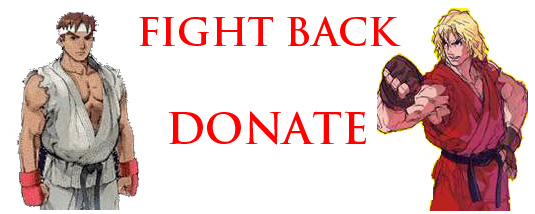
© All material Copyright 2010 by Bill Weintraub. All rights reserved.
Re: The Struggle Is Important
6-15-10
It is sad that Tom feels that he must stay anonymous because the butboys are so determined to keep their POWER.
They are EVIL but Tom is fighting back posting and donating. He is an example to others, for having read and accepted, he acted on what he learned.
Well done Tom! I agree with Bill -- you're a true Warrior!
The Struggle Is Important and with Tom and others like him it WILL go on until it is completed.
With Warrior Love,
Brian
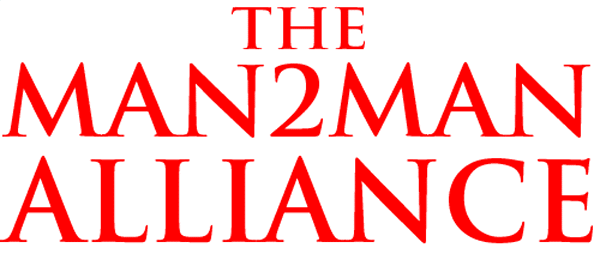






and
who reject anal penetration, promiscuity, and effeminacy
among men who have sex with men

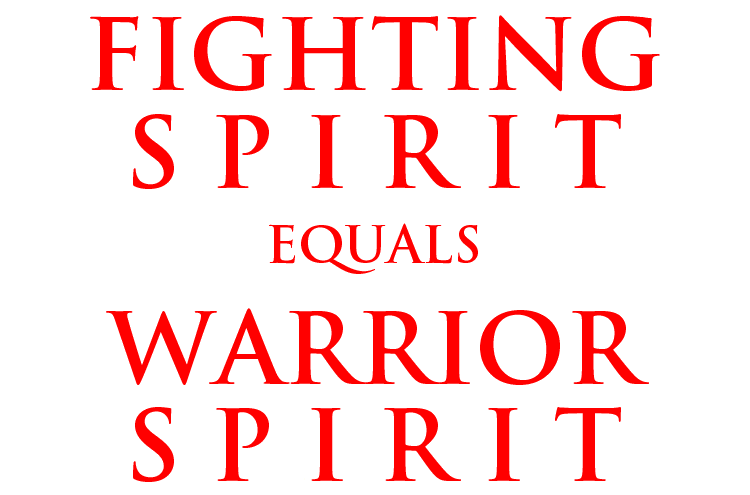
This aspect of our work is the one that's most disturbing and indeed frightening to our opponents:
That we combine the Love of Man with the Love of Fighting Spirit.
Which is Warrior Spirit.
The Warrior God is the Guardian of that Spirit.
You may call him Jesus Christ as Robert Loring does.
You may call him Ares as did the Greeks.
What's important is that you understand and acknowledge
the vital role He plays in Your Life.
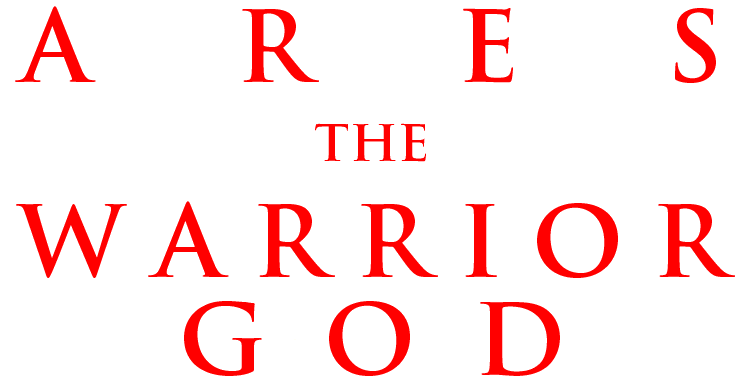
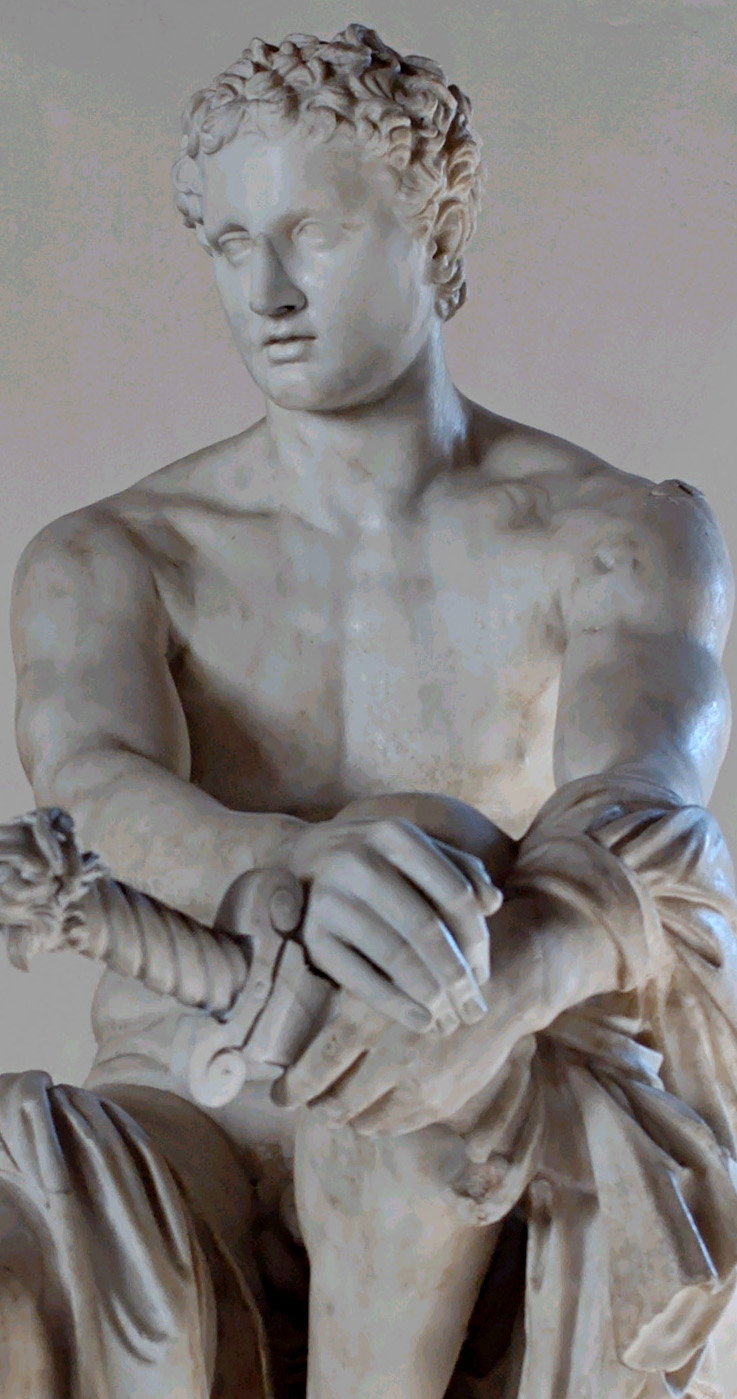



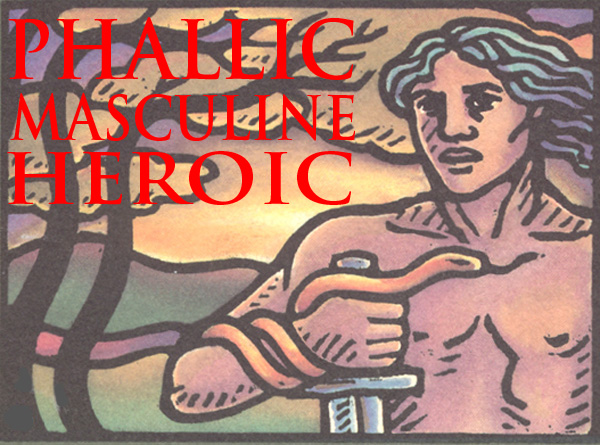



AND


Warriors Speak is presented by The Man2Man Alliance, an organization of men into Frot
To learn more about Frot, ck out What's Hot About Frot
Or visit our FAQs page.

| Warriors Speak | Ask Sensei Patrick | Warrior Fiction | Frot: The Next Sexual Revolution | Sex Between Men: An Activity, Not A Condition |
| Heroes Site Guide | Toward a New Concept of M2M | What Sex Is |In Search of an Heroic Friend | Masculinity and Spirit |
| Jocks and Cocks | Gilgamesh | The Greeks | Hoplites! | The Warrior Bond | Nude Combat | Phallic, Masculine, Heroic | Reading |
| Heroic Homosex Home | Cockrub Warriors Home | Heroes Home | Story of Bill and Brett Home | Frot Club Home |
| Definitions | FAQs | Join Us | Contact Us | Tell Your Story |

© All material on this site Copyright 2001 - 2011 by Bill Weintraub. All rights reserved.


